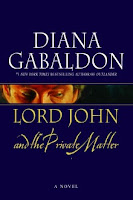Genre:
Historical, Mystery
Rating: A-
While I wasn’t
particularly a fan of Diana Gabaldon’s first foray into the Lord John series, I was pleasantly
surprised by its successor. In Lord John and the Private Matter everyone’s
favourite gay, nineteenth century English lord is back to solve another
mystery. This time, Grey is charged with
investigating the death of one Tim O’Connell, a sergeant in their regiment and
a suspected spy. O’Connell had been under
watch since the regiments return to England but died before the papers he had
stolen could be recovered – and the man watching him disappeared the same night
that O’Connell died. While going about
this, Grey is also investigating into the affairs of his young cousin’s fiancé,
whom Grey believes has syphilis and wishes to find a way to end the engagement
without creating a scandal that will shame his family.
I really
liked the way in which Gabaldon tied the various plots of the story together. It’s not something I really expect in a
Gabaldon novel; the Outlander books really
aren’t known for their closure (although one hopes that by the end of the
series things are all nicely wrapped up, with a bow on top), but Private Matter has plenty of
closure. The immediate issues O’Connell’s
death, espionage, and syphilis are all brought together and resolved in a
manner that one probably wouldn’t have expected – in a manner that I really
didn’t expect myself. Lord John isn’t my
favourite of Gabaldon’s characters, I’ve always found him to be a bit stale and
somewhat flat, and I usually can’t help but feel that his sexuality is just a new
way for Gabaldon to introduce more sex, and with a variety of partners (I’m rather
certain that of Gabaldon’s protagonists, John Grey has the largest number of sexual
partners). I have no problem with gay
characters, I just kind of roll my eyes when it seems apparent that the
character was created so that he can have sex with this guy, and this guy, and
this guy. In previous stories, Grey has always
appeared to be one such creation, but in Private
Matter he becomes more than just a slightly promiscuous gay English
lord. His sexuality is actually a part
of the plot, and for the first time Gabaldon divulges into the sexual
underworld of London. I thoroughly
enjoyed it.
The one
thing that I did dislike about Private
Matter, and really the one thing that I dislike about most of Gabaldon’s
books, is the historical note. II love
historical fiction and the thing that I’ve always enjoyed about books by
authors like Bernard Cornwell is the way that, in the end, there is a
historical note telling you about the real things relating to what you’ve just
read: Cornwell’s can be a good twenty pages long, telling you what characters
were made up and what are historical figures, as well as where he embellished,
made changes, and made assumptions, and where he didn’t, making little notes of
details of the plot. In Gabaldon’s
novels (and her novellas) the historical notes are always lacking. For someone who puts so much detail into her
writing, she is lacking in detail in her historical note and, while it doesn’t
take away from the overall story, to me it’s a bit of a disappointment.


No comments:
Post a Comment